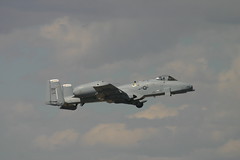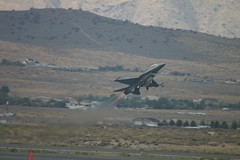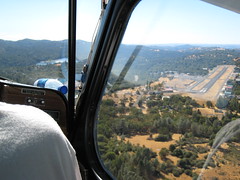Last night I attended the first night of a 10 week course (3 hours for 1 night each week) to prepare for the FAA's Instrument Flight Rules (IFR) knowledge test. As part of reinforcing what we cover each week, I'm trying to write up a quick summary of each night's topics.
 Sometimes typing things is a good way to refresh them in my own mind. Besides, you never know who might stumble onto this later and find it useful.
Sometimes typing things is a good way to refresh them in my own mind. Besides, you never know who might stumble onto this later and find it useful.
Introductions & Overview
Most of the first night was spend on introductions (meeting each other and our instructor), an overview of how the class will work, and some refreshers on various topics we all learned during our private pilot training.
Books
The main text for the course is the FAA's Instrument Flying Handbook which is available for free on-line. In addition, we're going to use the ASA Instrument Rating Test Prep for practice questions.
For additional reading, he suggested Jeppesen's Instrument/Commercial Manual and the FAA's Instrument Procedures Handbook. I'm told that those two do a better job of understanding the whole air traffic system and rationale behind why IFR operations work the way they doing.
Since I tend to remember things better when I understand why they work the way they do, I'm tempted to pick up those as well.
Finally, I have the King Schools Get It All Kit for the Instrument Rating. I've used their videos in the past and found them to be far superior to those from Sporty's.
VFR vs. IFR
 We spent a bit of time discussion the pros and cons of VFR vs. IFR flight, generating a list that looked something like this.
We spent a bit of time discussion the pros and cons of VFR vs. IFR flight, generating a list that looked something like this.
Pro IFR:
- Safety
- Charts have altitude info you need
- Get through weather
- Don't get stuck as often
Con IFR:
- Longer routes (takes more gas and time)
- Have to deal with controllers and radio
- Higher workload
Human Factors and Aeronautical Decision Making (ADM)
We spent a fair amount of time reviewing human factors, including medical issues, illusions, disorientation, night vision, and stress. We also talked about the FAA's IMSAFE (Illness, Medical, Stress, Alcohol, Fatigue, and Eats) self-assessment checklist.
In the real of ADM, we briefly recalled the FAA's DECIDE (Detect, Estimate, Choose, Identify actions, Do, Evaluate) model for dealing with situations. Everyone has to learn it, but few people actually think through it that way in reality.
Cockpit/Crew Resource Management (CRM)
Cockpit or Crew Resource Management is going to be a much more important skill to develop in IFR flight than our normal VFR operations. There's more paperwork in the cockpit, instruments to watch, and radio communication to deal with. So having a logical and predicatable system for organizing the physical objects (checklists, books, charts, flight plans, etc.) and other information is critical.
Having your flight plan handy is good for when the controller says "cleared as filed" rather than giving you a set of waypoints to copy down. :-)
Aerodynamics
 We concluded with a review of basic aerodynamics, including: indexing the airplane performance (for speeds and descent rates), angle of attack, flight path, pitch attitude, lift/drag/thrust/weight, and the various V speeds that come into play. We also talked a bit about the region of normal command and aircraft speed & pitch stability when using trim.
We concluded with a review of basic aerodynamics, including: indexing the airplane performance (for speeds and descent rates), angle of attack, flight path, pitch attitude, lift/drag/thrust/weight, and the various V speeds that come into play. We also talked a bit about the region of normal command and aircraft speed & pitch stability when using trim.
Other Stuff
I learned that following the VASI exactly at an airport will set you down at the 1,000 foot mark on most runways. That could be a very useful bit of trivia.
We also had chances to share stories about being, uh... surprised by weather in our flying.
Posted by jzawodn at September 20, 2007 11:09 AM | edit
Getting your IFR ticket so you can try some record wave cross country flights? Good move.
Good luck with your IFR ticket. You'll probably find (as I did) that it comes fairly easily. VFR flying is a kinesthetic skill, like driving a car or dribbling a basketball. IFR flying, on the other hand, is much more a mental skill like working a puzzle. If you're naturally an intellectually oriented person, it may actually come more easily than VFR flying.
There's also nothing quite like popping out at minimums and finding the runway dead ahead.
One of my IFR cross country training flights was into Chicago Midway airport on a hard IFR day with the ILS approach right at the minimum ceiling. That pretty much eliminated any nervousness I had about mixing it up with the big boys.
Wow, perfect. I've got the books and am studying at home - with a view towards doing the US IFR license in South Carolina as an intensive course. There's a few reasons why the US license, I should post about that at some point.
Anyway, your posts will be very useful to me! Thank you :)
I love this entry
It is a great idea
I am going to study right along with you as kind of a pre course... course
Thanks
Sylvia, I live in South Carolina and trying to find something like that. Where are you planning? Is it the one in Conway/ Myrtle Beach?
Please continue to discuss your ground school. I'm studying for my ground instructor tests, and find it helpful.
Good , great idea.
Wishing you all the best.
I looked over your notes on IFR and your initial class. Good Stuff! I will comment on your list of "cons":
"Longer routes (takes more gas and time)" If you are flying because you love it (who of us does not love it) then a few extra minutes of flying is a good thing and more time in your logbook.
"Have to deal with controllers and radio" This is my favorite. Controllers are there for YOU! Early on when you screwup on the radio you will remember it after the fact. The controller will forget all about you 5 seconds after you are handed off! Who cares! Take your time and learn by "screwing-up". Basically those guys are some of your best friends. If you ever really need the controllers help you will see who your friends really are!
"Higher workload" This is also a good one. I live in the Washington ADIZ area! I don't recall how to fly VFR! Actually I am a corporate pilot but when I fly my Bonanza I'm afraid to risk my certificate by flying VFR (it pays the mortgage and puts food on the table). Let the government take a little responsibility when those surprise TFR's pop up! If you choose to fly IFR most of the time (I recommend this after you get that IFR rating regardless of the weather) you will have a hard time staying awake when flying VFR. I love the IFR environment personally. It's more mentally stimulating and fun!
Best of luck but most importantly "HAVE FUN"!
Dave
I'll follow this series with interest. It's a great addition for you. I agree with the comment made by Shivering Timbers...there is nothing like popping out of the clouds and seeing a runway right in front of you. Hope you get some time in actual conditions and don't have to wear foggles the whole time.
Charles,
it's actually in Beaufort.
My boyfriend did the Accelerated IFR Program and was really happy with it. He's got a lot more hours than me and, quite honestly, is more technically minded, so I'm kinda expecting to need extra time.
Thanks for the info. It seems to be getting tougher to find a none accelerated ground school these days. I'm curious to know how it all worked out.
